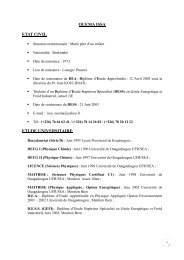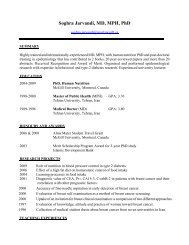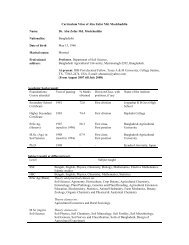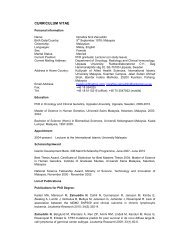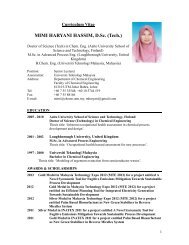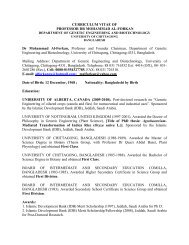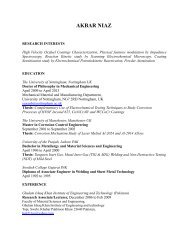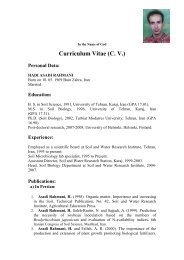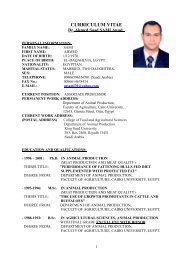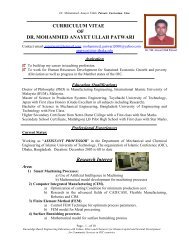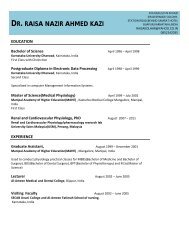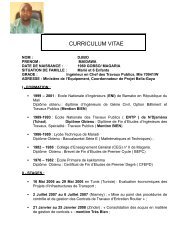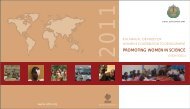Engineering: issues, challenges and opportunities for development ...
Engineering: issues, challenges and opportunities for development ...
Engineering: issues, challenges and opportunities for development ...
Create successful ePaper yourself
Turn your PDF publications into a flip-book with our unique Google optimized e-Paper software.
AN OVERVIEW OF ENGINEERING4.6.3 WFEO Model Code of EthicsSince 1990, WFEO has worked to prepare a Code of Ethics asa model to help defi ne <strong>and</strong> support the creation of codes inmember institutions. The fi nal version reproduced here wasadopted in 2001.Broad principlesEthics is generally understood as the discipline or field of studydealing with moral duty or obligation. This typically gives riseto a set of governing principles or values, which in turn areused to judge the appropriateness of particular conducts orbehaviours. These principles are usually presented either asbroad guiding principles of an idealistic or inspirational natureor, alternatively, as a detailed <strong>and</strong> specific set of rules couched inlegalistic or imperative terms to make them more en<strong>for</strong>ceable.Professions that have been given the privilege <strong>and</strong> responsibilityof self regulation, including the engineering profession, havetended to opt <strong>for</strong> the first alternative, espousing sets ofunderlying principles as codes of professional ethics which <strong>for</strong>mthe basis <strong>and</strong> framework <strong>for</strong> responsible professional practice.Arising from this context, professional codes of ethics havesometimes been incorrectly interpreted as a set of ‘rules’ ofconduct intended <strong>for</strong> passive observance. A more appropriateuse by practicing professionals is to interpret the essence ofthe underlying principles within their daily decision-makingsituations in a dynamic manner, responsive to the need of thesituation. As a consequence, a code of professional ethics ismore than a minimum st<strong>and</strong>ard of conduct; rather, it is a setof principles, which should guide professionals in their dailywork.In summary, the model Code presented herein expresses theexpectations of engineers <strong>and</strong> society in discriminating engineers’professional responsibilities. The Code is based on broadprinciples of truth, honesty <strong>and</strong> trustworthiness, respect <strong>for</strong>human life <strong>and</strong> welfare, fairness, openness, competence <strong>and</strong>accountability. Some of these broader ethical principles or<strong>issues</strong> deemed more universally applicable are not specificallydefined in the Code although they are understood to beapplicable as well. Only those tenets deemed to be particularlyapplicable to the practice of professional engineering arespecified. Nevertheless, certain ethical principles or <strong>issues</strong> notcommonly considered to be part of professional ethics shouldbe implicitly accepted to judge the engineer’s professional per<strong>for</strong>mance.Issues regarding the environment <strong>and</strong> sustainable <strong>development</strong>know no geographical boundaries. The engineers <strong>and</strong>citizens of all nations should know <strong>and</strong> respect the environmentalethic. It is desirable there<strong>for</strong>e that engineers in eachnation continue to observe the philosophy of the Principlesof Environmental Ethics delineated in Section III of thisCode.Practice provision ethicsProfessional engineers shall:■■■■■■■■■hold paramount the safety, health <strong>and</strong> welfare of the public<strong>and</strong> the protection of both the natural <strong>and</strong> the built environmentin accordance with the Principles of SustainableDevelopment;promote health <strong>and</strong> safety within the workplace;offer services, advise on or undertake engineering assignmentsonly in areas of their competence <strong>and</strong> practice in acareful <strong>and</strong> diligent manner;act as faithful agents of their clients or employers, maintainconfidentially <strong>and</strong> disclose conflicts of interest;keep themselves in<strong>for</strong>med in order to maintain their competence,strive to advance the body of knowledge withinwhich they practice <strong>and</strong> provide <strong>opportunities</strong> <strong>for</strong> theprofessional <strong>development</strong> of their subordinates <strong>and</strong> fellowpractitioners;conduct themselves with fairness <strong>and</strong> good faith towardsclients, colleagues <strong>and</strong> others, give credit where it is due<strong>and</strong> accept, as well as give, honest <strong>and</strong> fair professional criticism;be aware of <strong>and</strong> ensure that clients <strong>and</strong> employers aremade aware of societal <strong>and</strong> environmental consequences ofactions or projects <strong>and</strong> endeavour to interpret engineering<strong>issues</strong> to the public in an objective <strong>and</strong> truthful manner;present clearly to employers <strong>and</strong> clients the possible consequencesof overruling or disregarding of engineering decisionsor judgement; <strong>and</strong>report to their association <strong>and</strong>/or appropriate agencies anyillegal or unethical engineering decisions or practices ofengineers or others.Environmental engineering ethicsEngineers, as they develop any professional activity, shall:■■try with the best of their ability, courage, enthusiasm <strong>and</strong>dedication to obtain a superior technical achievement,which will contribute to <strong>and</strong> promote a healthy <strong>and</strong> agreeablesurrounding <strong>for</strong> all people, in open spaces as well asindoors;strive to accomplish the beneficial objectives of their workwith the lowest possible consumption of raw materials <strong>and</strong>energy <strong>and</strong> the lowest production of waste <strong>and</strong> any kind ofpollution;189



